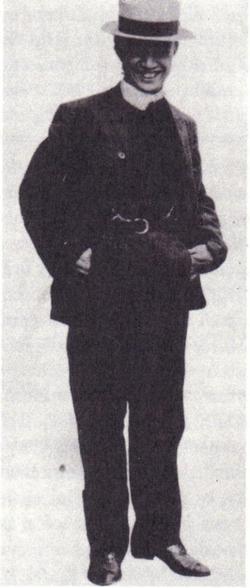Mock Duck (Mock Duck)

Hip Sing Tong leader, and one of New York’s most famous gang leaders. Mock Duck ruled the Hip Sing Tong based in Manhattan’s Chinatown during the first three decades of this century. Mock Duck’s Tong wars with the On Leong Tong are legendary. During the 1930’s Mock Duck retired and moved to Brooklyn where he died of natural causes. Before he came to Chinatown, the On Leong (Peaceful Dragon) Tong (parlor) and its owner, Tom Lee, faced only token opposition. Based at 15 Pell Street, the On Leong Tong took over from the Chee Kung, helped Chinese immigrants acclimate to the United States, and controlled the Chinatown opium dens and, most importantly, the gambling proceeds. From 1885 to 1900 they operated unmolested. In 1900, local reformers, led by Dr. Parkhurst, started to publicize the graft and corruption that came out of Chinatown. “Simultaneously there appeared a certain Mock Duck, once an On Leong man, a cherubic, ever-smiling, moon-faced Machiavelli, who looked upon Tom Lee’s profits, decided Tom was a wicked man, and said as much to Dr. Parkhurst. By some miracle Mock Duck escaped with his life to become the father of the Hip Sing tong and a rival of the On Leongs for control of the gambling privileges in Chinatown. He used to lisp in explaining the name of the organization, Î means plospelous, and Sing is Chinese word for union. We plospelous union all lite.â And he would beam in an irrisistible way of which only your Chinese politician has the secret.” Brooklyn Daily Eagle, October 19, 1924. “Out from the East by way of the West came little Mock Duck. He had the fat smile of a Chinese cherub. But there was a desperately impudent glint in his eye which not even Chinese stolidity could film over. He joined Wong Get [a rival tong]. He knew by tradition of the threat of Tom Lee to use the white man’s meddling as a foil to the devices of his Chinese enemies…Mock Duck went about his business methodically. He went before Tom Lee with dogged purpose set in his childlike fat features and stated his case. There was only veneration in his posture and his voice for ther eminence of the goat-whiskered patriarch to whom he made his astounding proposal. Translated, it was not complicated: literally it was Î50-50 or fight.” The World, December 4, 1924. What followed was 17 years of sporadic violence, murder, arson, and kidnapping. Through all the gunfire, Mock Duck was hit only once, in 1904, and spent three weeks in a hospital as a result. There were two major Îtongwarsâ under his watch, from 1904-1906 and from 1909-1913. The phrase “hatchet man” comes from these battles, because their assasins carried small axes in their long sleeves. Tom Lee weathered it all, and died a natural death in 1917, at the age of 76. Both the On Leong and Hip Sing tongs have burial spaces in “The Evergreens.” “He was a curious mixture of bravery and cowardice. He wore a shirt of chain mail, carried two guns and a hatchet and, although notoriously a poor marksman, earned a reputation for bravery for the utter disregard for his own safety he displayed when squatting on his haunches in the street with both eyes shut and firing at a surrounding circle of On Leongs. ….During the height of Mock Duck’s prosperity, agents of the Gerry Society investigated a report that his adopted daughter, Ha Oi, was a white girl. The courts found that she was the daughter of one Lizzie Smith, who had married a Chinese. She was taken away from Mock Duck. The Hip Sing leader was frantic, for he loved the girl tenderly. He carried the case to the appelate division but lost. Then, to drown his sorrow, he began to gamble recklessly as he roamed aimlessly to Chicago and San Francisco and throughout the Middle West. His despair was such that he didn’t care whether he won or lost. As usually happens to one in that frame of mind he made large winnings. He came back to New York with diamond studs blazing from his shirt front and $30,000 in his pockets. The old tong guns began to blaze again and hatchets gleamed. He was arrested many times but never convicted until 1912, when he was sent to Sing Sing for operating a policy game. It was when he emerged from prison that he announced he was through with the old life and intended to become a respectable citizen of Brooklyn.”Brooklyn Daily Eagle, February 29, 1932. (Bio compiled by J. Fodor)
Born
- February, 01, 1879
Died
- July, 24, 1941
- USA
- New York




